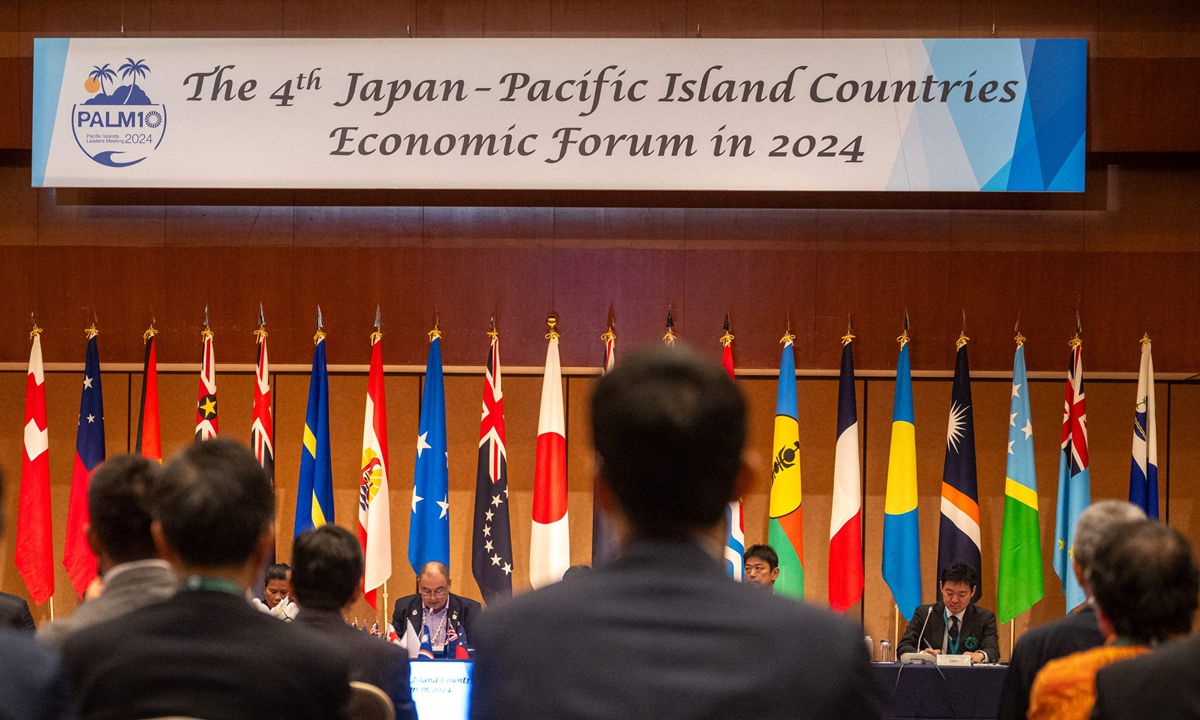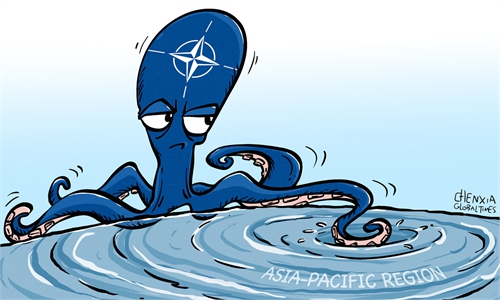
Photo: VCG
Under the indulgence of the US, Japan is becoming increasingly open about its wild ambitions and trying to impose the strategic intentions of Washington and Tokyo onto other regional countries. However, both Chinese and Japanese analysts pointed out that Tokyo is on a fool's errand, when commenting on the just-concluded 10th Pacific Islands Leaders Meeting (PALM10) hosted by Japan, which attempted to sow discord between China and Pacific Islands countries.
Japanese Prime Minister Fumio Kishida and representatives from 18 members of the Pacific Islands Forum, a regional body that also includes Australia and New Zealand, held PALM10 for three days from Tuesday.
According to AFP on Thursday, the joint statement of PALM10 claimed that the attendees "expressed strong opposition to any unilateral attempts to change the status quo by the threat or use of force or coercion," which was interpreted as a "veiled reference to China."
At this moment, Japan hopes to deepen military ties with the Pacific Island countries through this meeting, as the Pacific is a crucial location for the security of all countries, and China's growing influence has raised strong concerns for Japan and the US, Professor Yasukatsu Matsushima of the Faculty of Economics at Japan's Ryukoku University, told the Global Times.
Therefore, there is an urgent desire to bring the Pacific Island countries into the camp of the Japan-US alliance and involve them in military relationships such as the Quad mechanism made up of the US, Japan, India, and Australia, Matsushima revealed.
Under the pretext of the "China threat" theory, the Japanese government is trying to expand the influence of its Self-Defense Forces and Coast Guard to the Pacific Island countries. However, these actions will not provide real security for the Pacific Island countries, but will instead strengthen the actual control of countries like Japan and the US in the region, pushing them into a dangerous situation, the Japanese professor warned.
Chinese Foreign Ministry spokesperson Lin Jian on Thursday said that cooperation between Japan and Pacific Island countries should be conducive to the economic success and people's lives of the Pacific Island countries, to better mutual understanding and trust among regional countries, and to regional peace, stability, development and prosperity.
PALM10 also covered topics regarding the dumping of nuclear-contaminated water from the Fukushima Daiichi nuclear power plant into the ocean. Kishida explained Thursday that Japan will continue to share information with the island countries, Kyodo News reported.
The ocean is crucial for the economic development and cultural beliefs of the Pacific Island countries and their main focus is on how to deal with the mishandled nuclear-contaminated water, Matsushima said.
In this meeting, Japan is clearly paving the way with money, not only hoping to use 60 billion yen ($380 million) in development aid to win over some countries to support its own intentions and geopolitical strategies, but also to whitewash the fact that Japan is shifting the risk of nuclear contamination onto the whole world, said Lü Chao, a research fellow at the Liaoning Academy of Social Sciences. Some small island nations, under pressure from the alliance between the US and Japan, may not dare to strongly oppose this, but their dissatisfaction is evident, Lü noted.
Yu Lei, a professor at the Department of International Politics and Economics at Shandong University, believes that some South Pacific countries need the support of emerging powers such as China to strengthen their political independence and economic autonomy, while at the same time hoping to continue to receive economic assistance from their former colonial masters.
Yu emphasized that the vast majority of South Pacific Island countries do not want to, and will not follow Japan or other former colonial masters in containing China or reducing mutually beneficial cooperation with Beijing.
Matsushima told the Global Times that the actions of the Japanese government cannot weaken the connections between China and the Pacific Island countries.
Under the framework of the Belt and Road Initiative, China's support for the Pacific Island countries has greatly improved local infrastructure and economic development. Deepening political and economic cooperation with China can help the Pacific Island countries become more independent and less reliant on Japan and Western countries. It is evident that the local people believe that the Pacific Island countries will not easily be influenced by the Japanese government or cut off their ties with China, the Japanese professor said.



